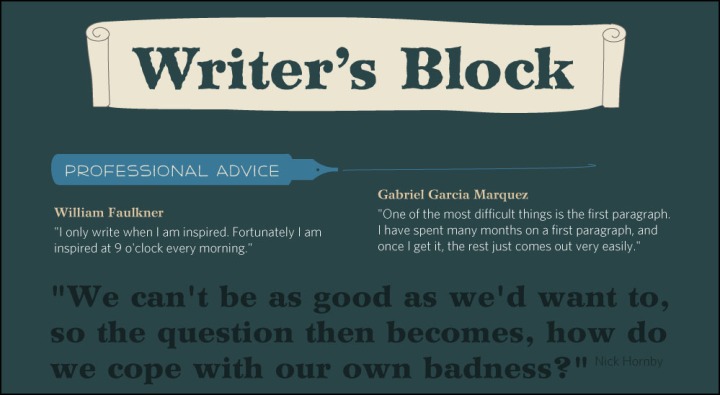
Ah, the blank slate.
The freedom. The possibilities.
The abject blinding terror…
Sitting with a blank sheaf of paper (or virginal Word document) before you, you have the boundless liberty to let your mind and words run free. You have the opportunity to conjure up undreamt-of landscapes populated with captivating characters, enthralling events and plots so twisty and turny that Machiavelli himself would weep to read them.
At this stage, the temptation to throw it all in and hide under the duvet with a packet of chocolate digestives is virtually overwhelming.
What should I write? Who should I write about? What’s going to happen? Will anyone read it? Why am I doing this? Why did I ever want to be a writer in the first place, oh Lord help me! Time for a biscuit…
The pressure of a blank slate needing to be filled is one that all of us writers encounter at one time or another. But we impose it upon ourselves. And you know what? It’s completely invented. Writer’s block doesn’t exist.
That’s right, you heard me correctly; writer’s block doesn’t exist.
Harking back to my previous post on taming writer’s block, I’d like to re-state the wonderful advice from Maya Angelou:
What I try to do is write… And then it’s as if the muse is convinced that I’m serious and says ‘Okay. Okay. I’ll come.’
Unless someone’s taped your fingers together with duct tape overnight, you can still write. Your imagination may have booked a package tour of Merthyr Tydfil for a few days, but that shouldn’t stop you from writing. So abandon all thoughts of cowering under the duvet and just write.
Write anything.
Slay the dragon of the blank slate with the sword of words (if you’ll excuse a mangled metaphor).
Write about what you had for breakfast, write about the colour of your socks, write about the wall you’re staring at with inspiration-free perspiration dripping from your forehead, or just write the word ‘badger’ 73 times. Then it’s no longer a blank piece of paper. That’s Step One. Huzzah!
Now carry on writing, don’t stop, don’t ever stop. It doesn’t matter if what you’re committing to paper is gibberish, you’ll find the groove as long as you carry on. It doesn’t have to be the next chapter of the novel, the next stanza of the poem, it doesn’t have to be the same characters or genre or even, Heaven forbid, of any great quality.
Start turning your account of breakfast into an account of the final breakfast recalled by an aristocrat huddled in a tumbril, awaiting his turn at the guillotine.
Morph the colour of your socks into the colour of the moon over Ganymede piercing the green-black gloom of night whilst below the surface, hideous beings toil in the depths of labyrinthine drone-mines.
Or the blank wall instantaneously transformed from a cracked and peeling canvas of magnolia by the livid crimson slash as the assassin’s bullet hits home, piercing the diplomat’s temple, taking with it fragments of skull and brain matter…
The instant you start putting words down, there’s no more blank slate and no such thing as writer’s block. The slight tremor of panic I felt 400-odd words ago at the blank slate which has become this post has morphed into a burning desire to carry on adding words to all those story openings. And I don’t even LIKE historical fiction. Or Sci-Fi. OK, so none of those lines are great quality or jaw-droppingly inventive, but they’ve kick-started a process and got me warmed up. Time now to head back to Dark Energies and apply that creativity to wherever it was that Dan and Kate were stranded when I last left off.
The only thing stopping you writing is you. Get over it. Stop worrying if it’s going to be good enough. It never will be if you don’t write it. Sure, you’ll throw a lot of it away, you’ll change a lot of it and only some will make the final cut.
But at least you’ll be doing what you’ve told yourself all along you wanted to do more than anything else in the world.
So just write.
Maybe get yourself a biscuit while you’re at it.
After all, what’s stopping you?
